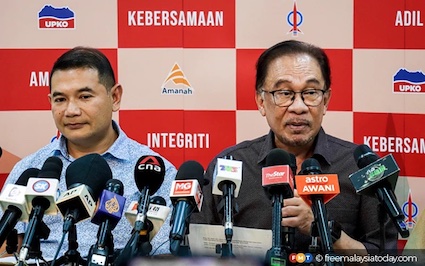Is Anwar Ibrahim’s “unity government” really stable, or is it just the lull before the storm?

(NST) – Prime Minister Anwar Ibrahim has made significant strides in maintaining political stability during his first 100 days in office, analysts said.
Political analyst Associate Professor Dr Awang Azman Awang Pawi of Universiti Malaya, commended Anwar’s decision to call for a vote of confidence and establish a unity government secretariat as measures that bolstered his administration.
He also highlighted that Anwar swiftly granted concessions to Sabah and Sarawak, which contributed to maintaining stability.
“This stability allows Anwar to focus on the country’s economy and strengthen ties with the neighbouring countries,” FMT quoted him as saying.
Under Anwar’s leadership, the government has increased the annual special grants to Sabah and Sarawak by at least 10-fold, with Sabah receiving RM260 million and Sarawak receiving RM300 million.
The Borneo states have also been granted autonomy over infrastructure projects valued at less than RM50 million.
Nusantara Academy for Strategic Research senior fellow Dr Azmi Hassan highlighted that the government has displayed little to no tension among its members despite varying ideologies.
He cited the peaceful coexistence of Umno and DAP as evidence of this.
However, Azmi pointed out that the instability within Umno remained a significant challenge for Anwar and posed a significant threat to the government’s longevity.
“The Umno elections will decide the destiny of the unity government. I believe that Umno will remain intact and the status quo will remain,” he said, adding that the government could last the full term.
Meanwhile, Universiti Kebangsaan Malaysia (UKM) analyst Dr Muhamad Nadzri Mohamed said Anwar’s current parliamentary majority may not be impervious to being toppled by a manoeuvre akin to the Sheraton Move.
“At the moment, the opposition is likely feeling victimised and they will try to find a way out,” said Nadzri, in reference to the claim by Bersatu leaders that they were victims of political persecution.
Nadzri, the head of UKM’s political science department, however, acknowledged the challenge of toppling Anwar’s government, given the existence of the anti-hopping law and the establishment of the unity government as mooted by the Yang di-Pertuan Agong.
However, Nadzri noted that Anwar has yet to make significant strides in reaching out to the opposition to ensure political stability, unlike his predecessor Datuk Seri Ismail Sabri Yaakob who signed a memorandum of understanding with the then opposition.
Nadzri suggested that reaching a consensus with the opposition would be crucial in achieving political stability.
Anwar’s unity government comprises Pakatan Harapan, Barisan Nasional, Gabungan Parti Sarawak, Gabungan Rakyat Sabah, Malaysian United Democratic Alliance, Parti Warisan, Parti Bangsa Malaysia, Parti Kesejahteraan Demokratik Masyarakat and independent MPs.

